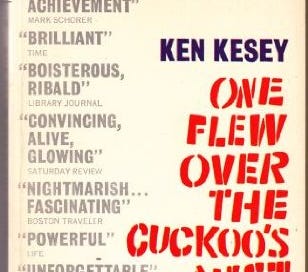Although the movie version of Ken Kesey’s One Flew Over the Cuckoo’s Nest garnered nine academy awards, including Best Picture, it left out what for me was the most poignant episode in the novel. That is when Randle McMurphy finds that some of his fellow patients in Nurse Ratched’s mental ward are not, as he is, legally committed to remain. They are free to leave, but for all of their complaining, they choose not to do so. [CORRECTION: Commenters point out that this scene is in the movie.]
I was reminded of this when listening to the recording of Tyler Cowen’s brief talk at this star-studded conference on academic freedom. All of the other speakers, including many affiliated with elite institutions, complain about how bad things are (I will get to some of the complaints shortly). Tyler is not having it. He says that if you think Harvard is repressive, you can have plenty of freedom at George Mason and/or posting on the Internet. “Just leave!”
The complaints refer to the most elite private universities. I did not take notes while listening to the recordings, so I may not be attributing complaints to particular speakers correctly. Also, I only listened to three sessions: the one on practical solutions, the Lee Jussim keynote, and the session on the economics of academic freedom.
Faculty skew not just heavily on the left (many departments have fewer than 5 percent conservatives) but radical left—40 % self-identify as such. (Jussim)
In the name of social justice, a leftist academic can say or publish things that violate every norm of rigor, decency, or logical coherence. But someone else can make a statement that is factual or innocuous, and if someone on the left takes offense, all sorts of punishment may ensue. (Jussim)
There is no point waiting for the pendulum to swing back. There is no pendulum. Once an institution has been ideologically captured, it stays captured. (Niall Ferguson, especially during the Q&A).
The governance structure of universities is dysfunctional, so that no one has the power and incentive to preserve academic freedom. (Richard Lowery)
Academic freedom has no enforcement mechanism. If you are deprived of academic freedom, you cannot appeal to any judicial process, on campus or off. (John Hasnas).
Competition is missing. Students do not like the Woke tyranny, but we do not see a flowering of new institutions or any existing institutions trying to stand out from the pack. (John Cochrane)
I think that one reason the problem is difficult is that the parents who want their children to attend elite schools are so screwed up. At least in K-12 education, there are parents who are actively fighting against Woke indoctrination. Maybe this is only taking place sporadically, and perhaps the cause is hopeless. But at least not every parent is taking this lying down.
When it comes to college, as far as I can tell, parents are desperate to send their children to Ivy League U, regardless of how insanely Woke it might be. Even ten years ago, before the Woke stuff hit, when I was teaching at a high school, the intensity of parents’ desires to see their children get into top universities saddened me.
I have yet to meet a parent who says, “Don’t worry about getting top grades in high school—it’s ok if you don’t get into Harvard. And choose extracurricular activities based on how well you enjoy them, not on how they will look on your transcript.” Much less a parent who says, “Don’t you dare go to Princeton! Not even if you get a full ride! Instead, find a school that’s halfway sane.”
The idea for a Network University is based on a number of hypotheses, including:
You cannot get parents to commit to a four-year alternative to college. Instead, hope that they are willing to let their children try something else for a year, to see how it goes. Ideally, students will get a job after a year or less, and they can continue studying while they work.
You can satisfy students’ needs for in-person contact with several three-day conferences or retreats, not requiring continuous on-campus presence.
A faculty mentor from the business world who knows a student well can either hire that student or place the student with a contact at a different firm. The personal letter of introduction and detailed letter of recommendation can replace the diploma as a credential.





As the graduate of a big state school in the south, I always find the obsession with Ivy+ to be a bit... much.
Everyone I knew in college is successful, employed, and generally functional (graduated '08 into a bad recession!). This spans from people who made millions in the tech industry to doctors, accountants to teachers (me) to artsy-fartsy types who are nonetheless doing fine.
We graduate hundreds of thousands of college students a year, most do not go to Ivy+ or even to moderately selective schools. Why do we insist on pretending that only the top ~50 universities are the pathway to a successful life?
Some parents are starting to leave the treadmill. I have a BS and MS from MIT and USC. My kids are getting community college degrees for hands-on trades. I may not impress my fellow alums, but I'll probably have more grandchildren.